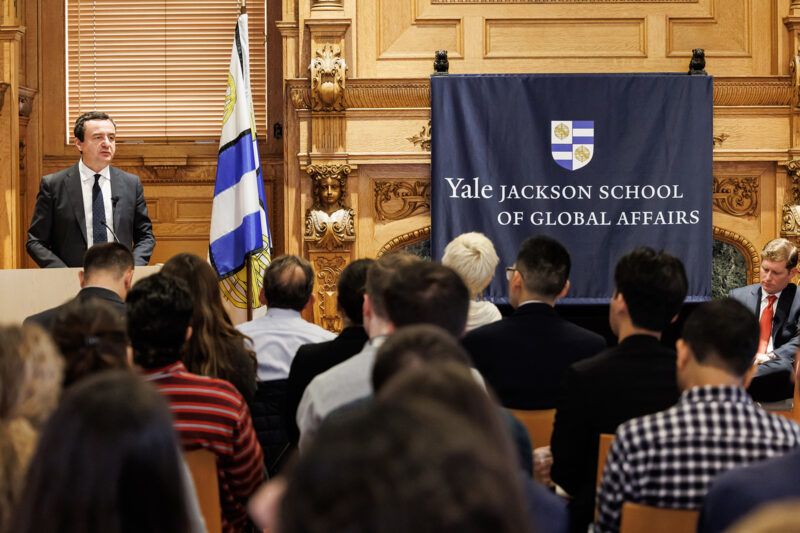Twenty-five years after its liberation, Kosovo has recovered from a devastating military conflict in 1999 to make significant progress as a fledgling democracy with a steadily growing economy, progressive social programs, and aspirations to join the European Union and NATO.
“Our path is clear — standing firm in our values, working hard, innovating and prospering,” said Kosovo’s Prime Minister Albin Kurti in remarks delivered September 30 at the Jackson School of Global Affairs. “It is a stark example of a simple but powerful message: that democracy can thrive despite all the challenges, threats, and uncertainties.”
Kurti’s visit was hosted by the Blue Center for Global Strategic Assessment, a new center at the Jackson School that advances the interdisciplinary study of statecraft by bringing together leading scholars and practitioners and supporting research and teaching related to national defense, diplomacy, intelligence, and international economic relations.
Following his formal address, Kurti was joined in conversation by the Blue Center’s executive director Phil Kaplan, who called Kosovo “a textbook story of the statecraft required of a new nation” with considerable relevance for Jackson students.
“Kosovo today represents, in many ways,” Kaplan said, “a perfect case study in managing the intersection of political, military and economic forces, in the relationship between security and governance, and in the confluence between deeply local and ethnic concerns with great power politics on the largest scale.”
Kurti has served as the prime minister since March 2021, previously holding the role for four months in 2020. Prior to that, he served in Kosovo’s parliament for a decade. His political life, however, began as a college student in 1997, when he helped to lead student protests against the Yugoslav regime, resulting in his imprisonment.
His release from prison in 2001 coincided with his country’s beginnings, he said, and serves as inspiration for his continued fight to build a successful democracy in Kosovo.
“In times of uncertainty, we must ground ourselves in what remains constant; for us, that constant is our origin story, what we are fighting for,” said Kurti. “A country must define what it stands for. It cannot solely define itself by what it opposes. For us, liberation is that story, and it influences us profoundly.”
Politically, Kurti said his administration is guided by social democratic tenants. Much of the focus of his term has been on social reforms; Kurti has introduced subsidies for women and children, free higher education, and a higher minimum wage. The country has also seen a steady increase in its GDP — an average of roughly $1 billion per year since 2020, according to The World Bank — and is seeking to address an energy crisis by committing to more renewables.
However, Kurti acknowledged serious geopolitical challenges. Kosovo’s relationship with Serbia remains contentious. Russia also wields considerable influence in the region, investing in Serbian energy and purchasing large amounts of real estate in Montenegro, according to Kurti.
The need for continued development while avoiding democratic backsliding make this a critical moment in Kosovo’s history.
“This means stronger alliances with democratic allies, as well as an urgency to join NATO and the EU,” said Kurti. “There is a strong need for democracies, both existing and emerging, to stand firmly together.”
